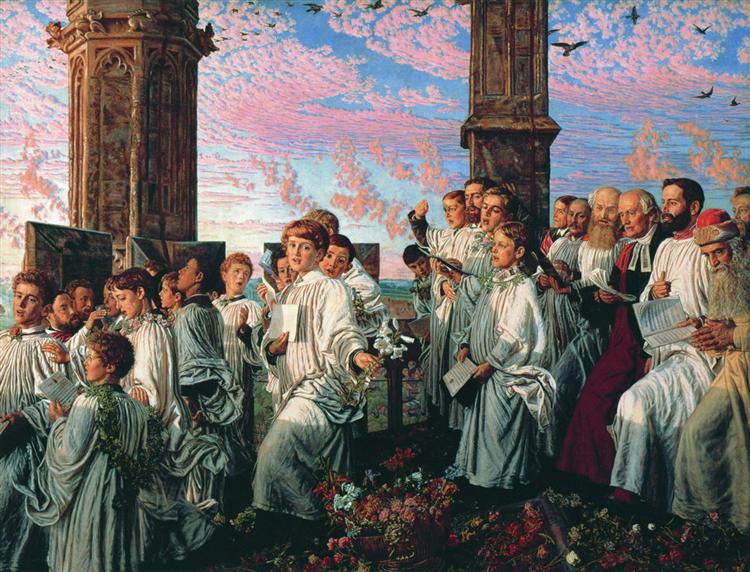Kuvaus
William Holman Hunt's 1891 painting "May Morning at Magdalen College Tower - Oxford" stands as a captivating example of the symbolism and detail that characterise both the author and the Pre-Raphaelite movement to which he belonged. Known for his meticulous approach to the depiction of nature and his interest in visual narrative, Hunt captures in this painting an emblematic moment that immerses us in the essence of spring in one of Oxford's most iconic places.
From the first glance, the composition of the work appears coherent and balanced, with the majestic Magdalen College Tower at the centre, standing proudly against a clear sky while flourishing nature surrounds it. The tower, with its elegant Gothic architecture, becomes the perfect backdrop for the central theme of the work: the celebration of May Day, a traditional holiday that resonates deeply in English culture. The inclusion of the architectural structure not only provides historical context, but also reflects the cultural and educational aspiration of the Victorian era, in which Hunt was deeply involved.
Hunt's choice of colors is representative of his signature style. The vibrant shades of green and gold that dominate the work evoke the freshness of spring and suggest a nature in full bloom. The deep green of the vegetation contrasts harmoniously with the warm yellow of the sun and the radiant blue sky, creating a visual interplay that infuses the scene with vitality. This use of color is not merely decorative; it serves to convey emotion, transporting the viewer to a moment of joy and renewal.
The characters in the work are absent in the most explicit way, but human presence is hinted at through the symbolic interpretation of the event. In the context of "May in Magdalen", what is celebrated is not only the flowers or the awakening of nature, but also the communal joy that accompanies such a festivity. The essence of the celebration is implied in the festive atmosphere that permeates the composition, suggesting a world full of life and camaraderie beyond what the image shows.
Symbolism is another key feature of this painting. Although it does not employ mythological or allegorical elements in an obvious way, the renewed cycle of nature that Hunt portrays can be interpreted as a symbol of the continuous renewal of life and hope, reinforcing the connaturality between human beings and their environment. Through his work, Hunt seems to advocate for the appreciation of elements of life that are often overlooked in the bustle of modernity.
Hunt's technique, attention to detail and ability to capture natural light and atmosphere remain his hallmark. His meticulous method of colour application and focus on lighting reflect the influence that plein air painting had on his work, a technique that allowed for a deeper understanding of the natural scene.
In conclusion, “May Morning at Magdalen College Tower - Oxford” is a representation of not just a place and a time, but of an era and a feeling that resonates through the years. It captures the essence of the celebration of life, the beauty of nature and community spirit, while reminding us of the importance of working in harmony with our environment. This painting, in all its magnificence, stands as a lasting testament to William Holman Hunt’s exceptional talent and his invaluable contribution to the history of art.
KUADROS ©, a famous painting on your wall.
Hand-made oil painting reproductions, with the quality of professional artists and the distinctive seal of KUADROS ©.
Painting reproduction service with satisfaction guarantee. If you are not completely satisfied with the replica of your painting, we will refund 100% of your money.

